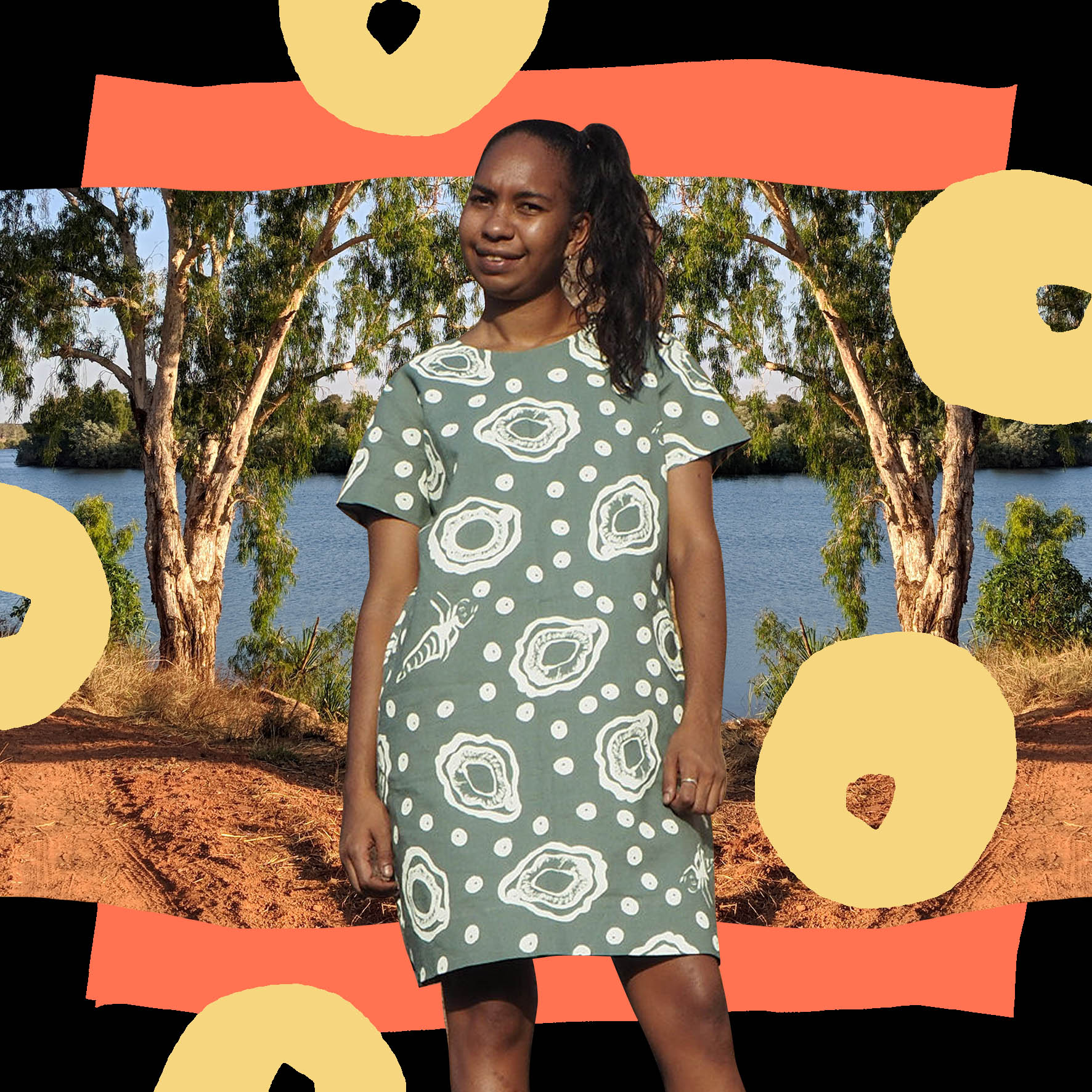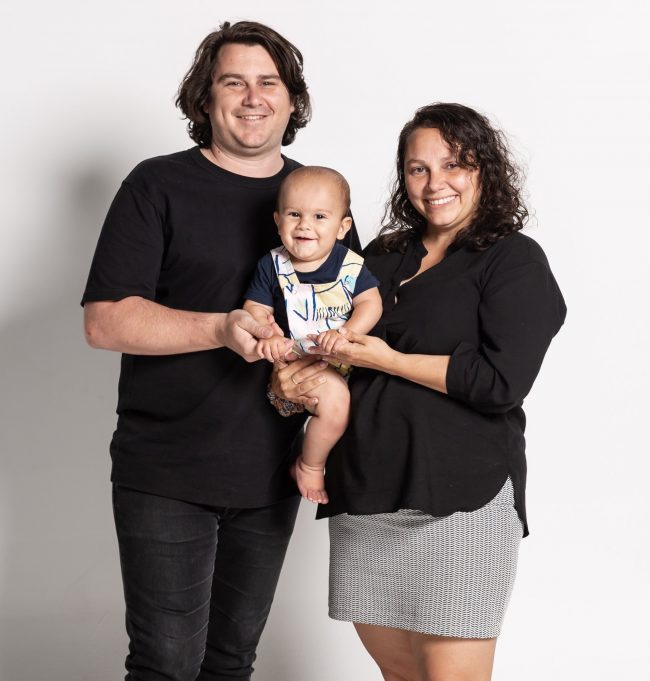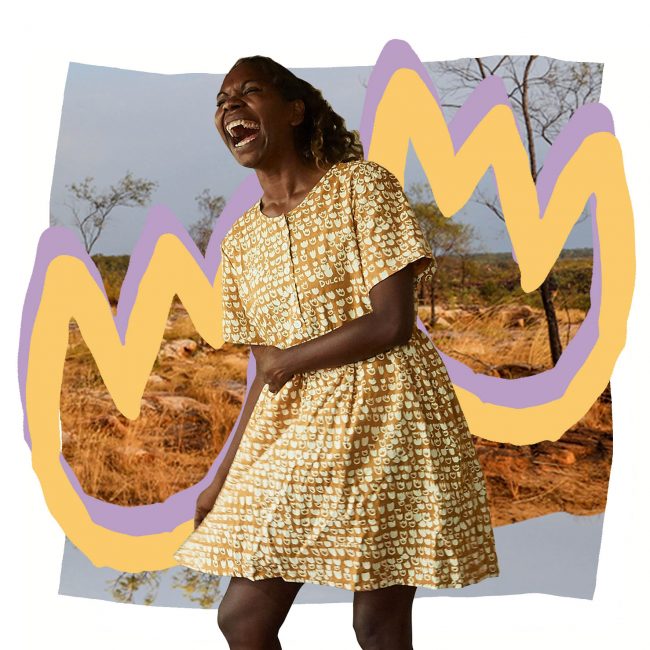
Magpie Goose: Combining Culture, Art, and Sustainable Fashion
Tucked away in South Brisbane’s culture and arts precinct is Magpie Goose – a self-proclaimed bright, bold, and unapologetic social enterprise fashion label.
Launched in 2016 by two non-Indigenous women, Lauren Egan and Maggie McGowan, Magpie Goose has since made a name for themselves with their clothes that turn their wearers into walking art exhibitions.
As of 2021, the label has transitioned into Aboriginal ownership, making history as the first company in Australia to do so.
The trailblazing duo Troy Casey, a proud Kamilaroi man, and Amanda Hayman who is a proud Wakka Wakka and Kalkadoon woman are using their strong connection to the community to increase the impact that the brand has already created.

Magpie Goose Owners Troy Casey and Amanda Hayman
The pair’s journey with sustainability and sustainability has been an easy ride, with their interest stemming from their Aboriginal heritage.
“[Aboriginal culture is] one of the most sustainable, innovative, and resourceful cultures,” Amanda says.
“We’re very much interested in caring for country. We’re conscious of creating a little impact on the environment,” Troy agrees.
Their overarching goal is to showcase and elevate Aboriginal stories and culture from across Australia.
Thousand-year-old stories of country, landscape, people, language, culture, history, and traditional and contemporary life into their dynamic designs that are meticulously screen-printed onto textiles.

Image Credit: Magpie Goose/Kalumburu Photography Collective, Collage by: Millie Shorter
Working with Aboriginal artists in remote areas, Magpie Goose creates opportunities to generate income by growing new market opportunities in the textiles and fashion industries.
However, employment opportunities for First Nations and raising awareness about their culture isn’t the only issue this social enterprise tackles.
Impacts of the fast fashion industry
Fashion is the second-largest polluting industry globally, producing substantial amounts of waste, pollution, and greenhouse gases annually which depletes non-renewable resources in the process.
The figures are grim; according to a report for the Monash Sustainable Development Institute, an estimated 6,000 kilograms of textiles and clothing are dumped in a landfill every 10 minutes in Australia. The textile industry contributes to approximately eight per cent of carbon emissions and 20 per cent of the planet’s wastewater.
The rise of fast fashion worsens this issue as higher demand for cheap clothes increases. Synthetic fabrics used by fast fashion brands, such as polyester, nylon and acrylic, are plastics made from petroleum and can take up to a thousand years to break down in landfills.
As a small fashion label, the couple wants to grow and expand their business, scale-up, and make more clothes.
“But turning our clothes into fast fashion is something we’re not interested in,” Troy asserts.
With their sustainably made clothing, Magpie Goose ensures they are part of the solution, not the problem.
“Being new owners of a fashion business, we’re aware that the fashion industry has the biggest impact on the environment. Trying to mitigate [the industry’s effects] is super important,” Troy says.
“Trying to articulate and educate broader audiences about the impact of fast fashion on the environment is really important too.”
Many of the processes and practices the couple continues to use today were developed by the cofounders, Maggie and Laura.
“There’s a whole bunch of strategies we have in place. But if more people understand the impact that fast fashion has, they might want to shop a little more consciously,” Troy says.
Part of these strategies includes their commitment to using environmentally friendly and biodegradable materials; all their handmade clothes are created using biodegradable materials such as linen, cotton, silk, and lyocell.
Cycle of sustainability
To stay on the path to zero waste, garments are made in small quantities to ensure each piece sells out entirely.
“Once you start to think about sustainability holistically, you start to identify opportunities across your business to minimise the amount of plastic and waste,” Troy says.
Leftovers and offcuts are repurposed into baby rompers, bibs, dog-kerchiefs, scrunchies, headbands, and bum bags. In Troy’s opinion, this practice is one of the most noteworthy aspects of Magpie Goose. This also helps diversity their product range.
Their clothes’ entire cycle starts with sustainability; from the moment the garments are made in a local ECA-accredited clothing manufacturer until it reaches Magpie Goose’s clothing racks or customer’s doorstep.
“When our manufacturer sends us our clothes, we ask them to not put them into any plastic,” Troy says.
Instead, they are pressed and shipped to Brisbane in cardboard boxes. Afterwards, orders are sent out in compostable bags; inside, customers will find a reusable calico drawstring bag to reduce the use of single-use plastic and marketing materials printed on recyclable cards.
Looking to the future
So, what’s next for Magpie Goose?
While the COVID-19 pandemic has had a considerable impact on the fashion industry – and especially, small, local businesses – but, the future of fashion is not always bleak.
“We hope that there will be a strong turn back to Australian-made, ethical, sustainable, local production. We think the economic downturn [due to COVID] will affect big fast fashion brands who produce cheaply and unethically in developing countries,” a statement published on the Magpie Goose website reads.
“We’ve only had the business since March and we’re just getting our heads around how the business all works,” Amanda says.
“When we figure everything out, we’ll look at things like becoming a B Corporation and carbon offsetting. Those kinds of initiatives are some goals of ours,” she continues.
Businesses that meet the highest standards of verified social and environmental performance, public transparency, and legal accountability to balance profit and purpose can become certified B Corporations.
Troy adds that as business owners and operators, they want to incorporate sustainability into every aspect of their business.
“Not only just the production elements but the kinds of pens and papers we use, four-stage recycling bins,” he explains.
The rise of fast fashion and overconsumption accelerates the importance of fashion labels to put sustainability at the centre of their business. Not only is Magpie Goose paving the way for Indigenous Australians, but their sustainable business practices are creating a path for others to prioritise the planet.
Alita Sokhara Say
I'm in my final year of a Bachelor of Communications, majoring in public relations and minoring in journalism.
